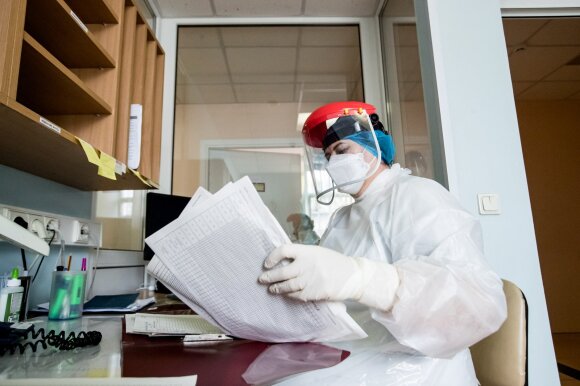
[ad_1]
Private family clinics have rejoiced in recent years against state polyclinics that are winning the battle for enrollment. And since March, due to COVID-19 restrictions, the closure of medical offices and the start of a new form of telephone treatment, patients have flocked to individuals even more intensely.
Work by phone
According to the Panevėžys Territorial Health Insurance Fund (ICD), the number of patients treated remotely in the personal health care institutions of the municipality of Panevėžys in the spring, compared to the same period last year, had increased on average 69 times. Last year, doctors working in the public sector in Panevėžys provided remote services for just a few hundred a month, and this year, from March to June, such treatment amounted to almost 30,000. cases during the same period.
Telemedicine leader in Panevėžys – Nemuno str. city polyclinic in operation. From March to June, it declared remotely providing more than 33 thousand. consulting and other services. During the same period last year, the figure was just 758.
From the beginning of the year to September, according to data from the Panevėžys ICD, the number of residents registered at the city’s polyclinic decreased by almost 300, from 32513 to 32203.
What are the reasons for this, the management of the polyclinic did not respond.
The Panevėžys Polyclinic lived a kind of golden age a few decades ago. When this institution began to function in 1991, the number of people in any medical institution in the city, which is difficult to understand today, was enrolled in it: about 130 thousand, which is even more than the current population of Panevėžys .
Neringa Šinkūnienė, chief physician of the Panevėžys District Municipal Polyclinic, said that there have been the same number of registrations at this institution since March, when the coronavirus appeared in Lithuania.
Felt Activation
Ieva Milinskaitė, director of the Panevėžys Family Medical Center, a private clinic that opened its doors in August, believes that a large number of clients chose her institution also because it made it difficult to knock on the doors of state polyclinics in the face of the threat of COVID-19.
According to her, the clinic receives a number of patients enrolled in a state institution, when the patient does not receive a consultation without calling his own doctors.
“They don’t pick up the phone, but if they answer, they communicate harshly; we hear such complaints from our new customers,” says I. Milinskaitė.
Remote telephone consultations are also an important part of the services provided by the clinic doctors. I. Milinskaitė ensures that over the phone, drug prescriptions are mostly extended, non-urgent assistance is provided and without tests.

Ongoing migration
On September 1, 9,778 residents were registered at two clinics in Panevėžys that belong to the Medica Clinic network of private clinics. According to the Panevėžys ICD, nearly 14,000 of these institutions provided remote services from March to June, compared with 40 last year.
Sandra Navickienė, Director of the Medica Clinic Panevėžys region, says that the number of enrollments in this institution has been increasing for a long time and on a regular basis.
“People are becoming more demanding and intolerant of the services they receive, which is why the growing migration of clients between medical institutions is a normal phenomenon. And it is not necessary to run only from state institutions, but also to get out of private clinics. But that comparison “as in the state” is still heard from patients: they want more care, “emphasizes S. Navickienė.
She herself says that she has good opinions about public outpatient clinics, she knows how much effort they make in this difficult time. However, S. Navickienė does not deny that another patient flees from these institutions without hating the remote treatment.
“Some of the state medical institutions are signing because of the current situation, but we do not feel such a spike,” says S. Navickienė.
Privatists win the race
Alma Čiplienė, Deputy Director of the Panevėžys Territorial Health Insurance Fund, states that the transfer of the population from one medical institution to another has taken place and is occurring all the time and that such migration is a natural process.
“At the same time, we recommend choosing the institution that has a contract with the ICD and is closer to the patient’s home, more accessible, the one where he wants to receive treatment,” says A. Čiplienė.
The representative of the Territorial Health Insurance Fund claims that he does not see a clear trend that the people of Panevėžys have started to rapidly switch medical institutions since March, when the coronavirus entered Lithuania. However, admits A. Čiplienė, part of him left the state medical sector.
According to Panevėžys ICD, there are 5 public primary health care institutions and 17 private clinics in our city and district. 63,336 inhabitants (49.8%) enrolled in public institutions and 63,774 (50.2%) in private institutions a little more. At the beginning of the year, this proportion was about the same: public medical institutions had 63,478 registered residents, private – 6,3525.
And a year ago, enrollment in private institutions represented 49.8%.
Over the past decade, the race for private medicine clients has accelerated significantly. In 2010, there were three public primary health care institutions and 16 private ones in Panevėžys city and district. 90,101 inhabitants (57%) enrolled in public institutions and 67,516 (43%) in private institutions.
[ad_2]